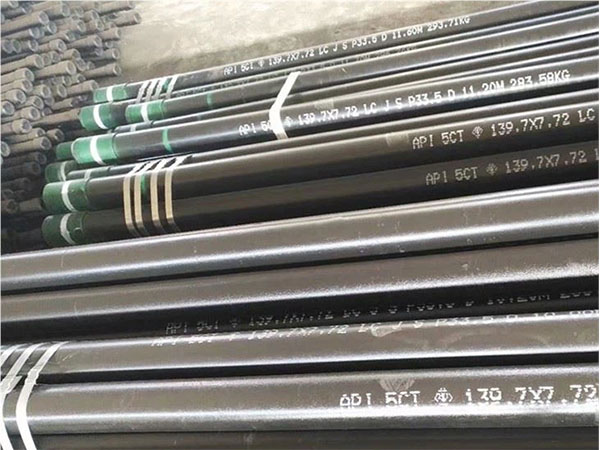Carbon steel casing pipe refers to the oil well casing made of carbon steel material, which is used to protect the wellbore formed during drilling, isolate different formations, and prevent downhole fluid from invading the well. It is usually made of low-carbon or low-alloy carbon steel, has good mechanical properties and weldability, and can operate stably for a long time under certain pressure and temperature conditions.
Casing, tubing and
drill pipe belong to the special oil pipe. OCTG, the full name of Oil Country Tubular Goods, is a kind of special oil tubular goods. It refers to a type of steel pipe specially used for oil and gas extraction. Most of the petroleum special pipe is seamless pipe, but welded pipe also accounts for a considerable part.

Product type classification
Drill Casing
It is used to protect the wellbore wall during wellbore drilling to prevent wellbore collapse and formation fluid infiltration into the wellbore.
Intermediate Casing
It is installed after drilling and before the production phase to isolate different formations, control fluid flow and provide structural support.
Production Casing/ Tubing
Pipe systems for the final delivery of oil and gas, such pipes require high pressure resistance and tightness.
Common models and grades
API 5CT carbon steel casing in a variety of steel grades (e.g. J55, N80, P110, etc.) for oil and gas well support, formation isolation, and high-pressure environments.
J55/K55
Material: Carbon steel (such as 37Mn5), carbon content 0.34%~0.39%, manganese content 1.25%~1.50%.
Mechanical properties: tensile strength ≥517 MPa, yield strength 379~552 MPa.
Application: Shallow or low pressure oil and gas Wells, suitable for non-corrosive environment, economical price.
N80
Material: Low alloy steel (such as 36Mn2V), containing vanadium (V) 0.11%~0.16%, improve strength and toughness.
Mechanical properties: tensile strength ≥689 MPa, yield strength 552~758 MPa.
Application: Medium and deep Wells and weak corrosive environment containing hydrogen sulfide (H₂S).
L80
Material: Chrome-containing alloy steel, divided into L80-1 (low chromium), L80Cr9 (9% chromium), L80Cr13 (13% chromium).
Mechanical properties: tensile strength ≥655 MPa, yield strength 552~655 MPa, hardness ≤241 HB.
Application: Corrosive environments containing CO₂ or H₂S (e.g. acid gas fields).
P110
Material: Chrome-molybdenum alloy steel (such as 30CrMo), containing 0.8%~1.1% chromium, 0.15%~0.25% molybdenum.
Mechanical properties: tensile strength ≥862 MPa, yield strength 758~965 MPa.
Application: High pressure environment in deep or ultra-deep Wells, with anti-sulfur measures.
Other special steel grades
C90/T95/Q125/V150: Higher strength steel grade, suitable for ultra-high pressure or complex geological conditions, requiring customized production.
Dimensions and specifications
J55, N80
Outer diameter: 48.26mm (1.900 in).
Wall thickness: 3.18~8.53mm.
N80, L80
Outer diameter: 73.02mm (2.875 in).
Wall thickness: 5.51~11.18mm.
P110, Q125
Outer diameter: 88.90mm (3.500 in).
Wall thickness: 5.49~13.46mm.
L80, C90
Outer diameter: 114.30mm (4.500 in).
Wall thickness: 6.0~10.0mm.
Specific size deviation requirements:
Outer diameter: ≤101.60mm ±0.79mm, ≥114.30mm +1.0%/-0.5%.
Wall thickness: Allowable deviation -12.5%.
Chemical composition requirement
Carbon (C) : J55/K55 is 0.34%~0.39%, P110 is 0.26%~0.35%.
Chromium (Cr) : L80Cr13 contains 12%~14% chromium, which enhances corrosion resistance.
Sulfur (S) and phosphorus (P) : both ≤0.020%.
Manufacturing and testing requirements
Heat treatment: L80 and P110 require quenching + tempering treatment to improve strength.
Test items: hydrostatic pressure test, sulfide stress corrosion test (SSC), hardness test (ASTM E18).
Read more : Seamless carbon steel pipe - oil casing
